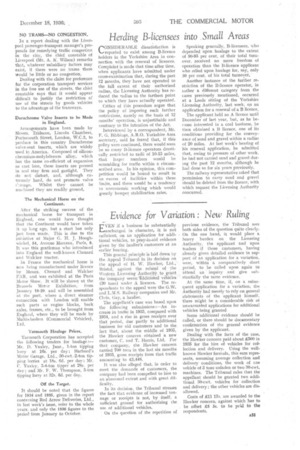Evidence for Variation : New Ruling
Page 33

If you've noticed an error in this article please click here to report it so we can fix it.
EVEN if a business be substantially unchanged in character, it is not sufficient, on an application for additional vehicles, to pray-in-aid evidence given by the haulier's customers at an earlier hearing.
This general principle is laid down by the Appeal Tribunal in its decision on the appeal of H. W. Hawker, Ltd.,' Bristol, against tbe refusal of the Western, Lieensing AuthoritY , to _grant the etniipanY seven tdditional vehicles (20 tons) under A licences. The respondents to the appeal 'i'ere the G.W. and L.M.S. Railway companies and Mr. Chris, Gay, a haulier.
The appellant's case was based, upon the following submissions :—An increase in traffic in 1935, compared with 1934, and a rise in gross receipts over that period, due partly to additional business for old customers and to the, fact that, about the middle of 1935, the Hawker concern obtained a new customer, C. and T. Harris, Ltd. For that company, the Hawker concern carried 700 toils in the last six months of 1935, gross receipts from that traffic amounting to £1,448.
It was also alleged that, in order to meet the demands of customers, the company had been compelled to hire to an abnormal extent and with great difficulty.
In its decision, the Tribunal stresses the fact that evidence of increased tonnage or receipts is not, by itself, a sufficient ground for authorizing the use of additional vehicles.
On the question of the repetition of previous evidence, the Tribunal sees both sides of the question quite clearly. On the one hand., it would place a heavy burden on the Licensing Authority, the applicant and upon traders if those customers, having already given detailed evidence in support of an application for a variation, were, within a comparatively short period, to be called upon again to attend an inquiry and give substantially the same evidence.
At the same time, if, on a subsequent application for a variation, the Authority had merely to rely on general statements of the applicant himself, there might be a considerable risk of unwarranted applications for additional vehicles being granted.
Some additional evidence should be called, or there should be documentary confirmation of the general evidence given by the applicant.
Dealing with the facts of the case, the Hawker concern paid about £500 in • 1935 for the hire of vehicles for collection and delivery. Using the wellknown Hawker formula, this sum represents, assuming average collection and delivery conditions, the work of cne vehicle of 3 tons unladen or two 30-cwt. machines. The Tribunal rides that the appellant should be granted two additional 30-cwt. vehicles for collection and delivery ; the other vehicles are disallowed.
Costs of £11 17s. are awarded to the Hawker concern, against which has to be offset £5 5s. to be paid to the respondents.




















































































